For those who love reptiles, bearded dragons make fantastic pets. They have their own unique characteristics and are cute and entertaining. How long do they live is something you should know before bringing one home. They require long-term dedication!
Although bearded dragons originated in central Australia, it is currently illegal to export wild bearded dragons. In the US, bearded dragons are only bred in captivity.
With proper husbandry, a bearded dragon has a life expectancy of 10-15 years. All the elements that go into taking care of a pet—such as feeding, lighting, temperature, medical attention, and more—are together known as husbandry.
So Take a moment to think that you may have this exotic friend for 10 years of your life. This article will help you in understanding the life expectancy of bearded dragons and how to ensure that they live long healthy lives.
Lifespan and Age of a Bearded Dragon on Average
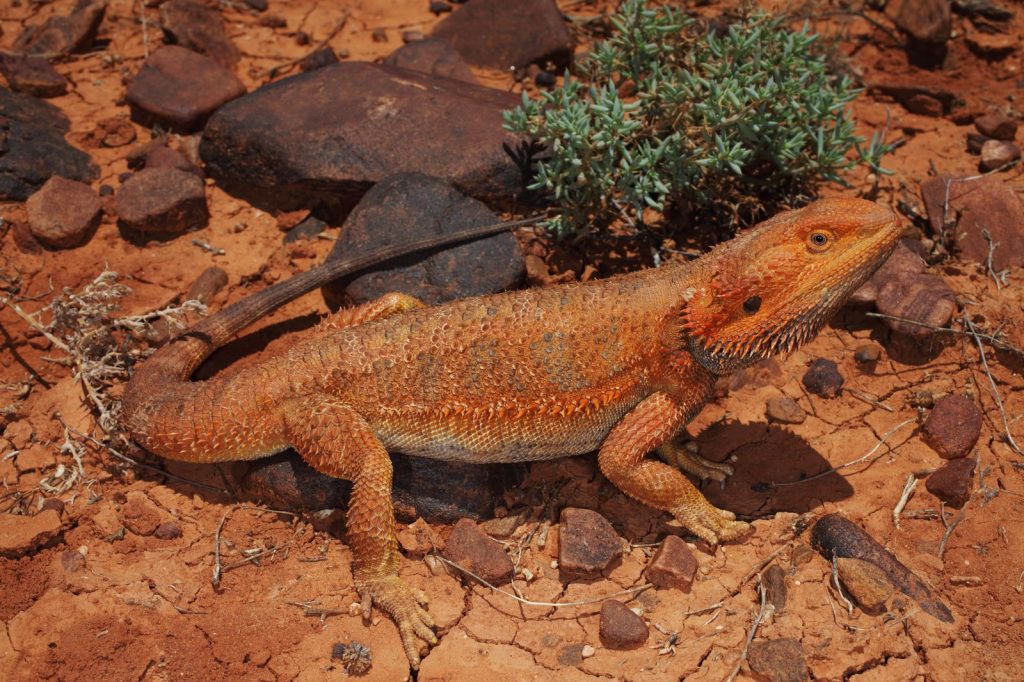
Typically, a bearded dragon in the wild lives for 8-10 years. This number changes according to the lizard’s overall health, domestic status, general care, and other factors. Although some bearded dragons have been known to live up to 18 years, 15 years may seem like a long time.
In fact, according to the Guinness Book of World Records, the oldest bearded dragon ever lived was 18 years and 237 days old.
Compared to bearded dragons kept as pets, wild bearded dragons have much shorter lifespans.
Common birds that hunt on bearded dragons are hawks and buzzards. In addition, wolves and large cats attack them.
Bearded dragon attacks can result in fatalities or severe injuries, drastically reducing the population’s average life expectancy.
In the wild, Beardies may experience droughts and difficulty finding food. Droughts and food shortages make it harder to survive.
Bearded dragons need to drink 20 to 30 mL of water per kilo per day to stay hydrated. Sometimes, this is challenging due to their dry, desert-like climate.
A bearded dragon’s lifespan is reduced by three to six years when predation, food shortages, and droughts are combined.
How Long Do Bearded Dragons Live In Captivity
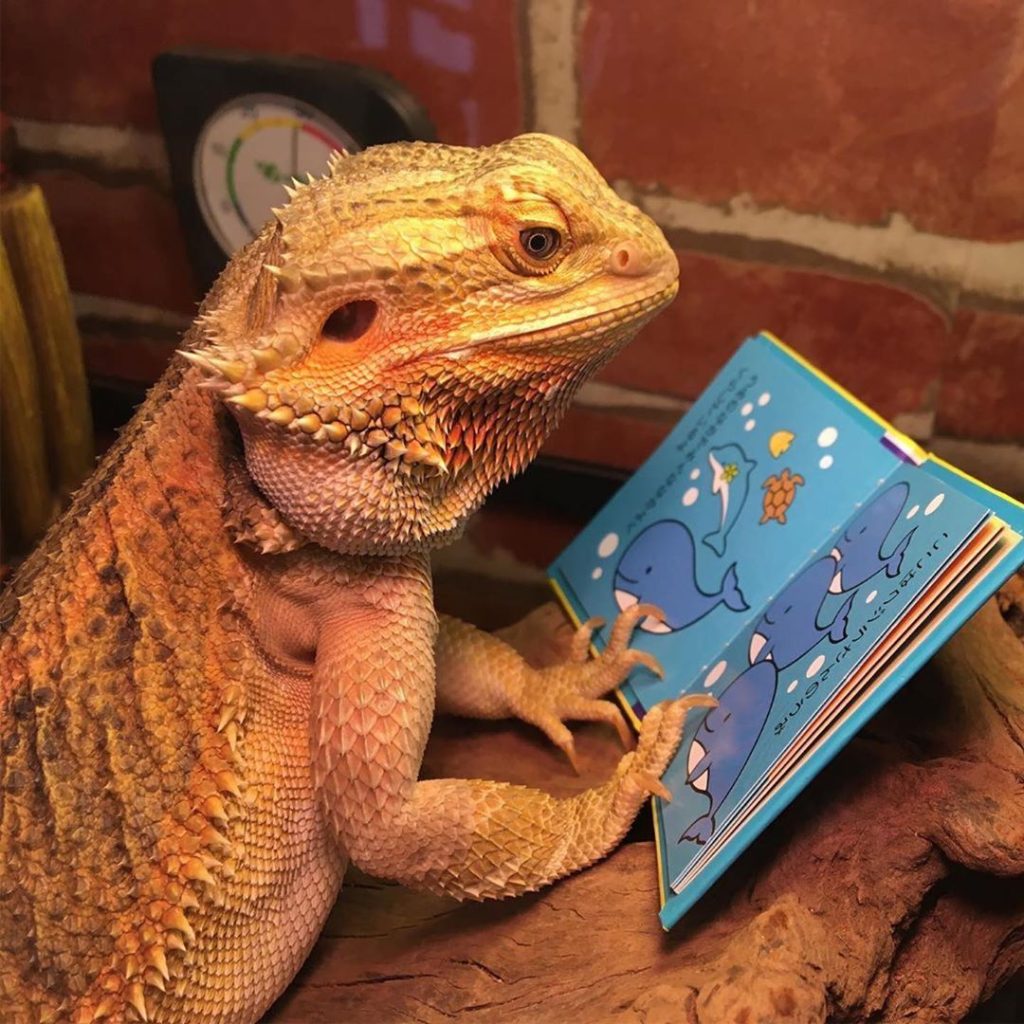
A very well-nurtured pet bearded dragon has an 8-12 years average lifespan. Predation is not an issue for bearded dragons kept in captivity.
They shouldn’t have issues like a lack of food or water, either. They live longer when these things are combined with a healthy diet.
Captive beardies have the ability to live a lot longer than their wild counterparts. Pets that are not adequately cared for, however, will live as long as wild creatures.
A bearded dragon needs the right amount of lighting, heat, humidity, space, food, and vitamins to survive and thrive.
Your lizard will be healthy and happy if you put in a little extra time each day for husbandry.
It will also extend their lives by years. Normally, male bearded dragons tend to live longer than females.
Following are the various age ranges for bearded dragons kept in captivity-
5 to 8 Years: The oldest they can become in the wild is 5 to 8 years old. If the owner does not pay close care to the animal’s diet, lighting, etc., then this is also how long they can survive in captivity at their maximum.
8 to 12 Years: If the owner takes good care of his dragon, it can live up to 12 years.
12 to 15 Years: The longest a dragon can live in captivity is 12 to 15 years, provided they are given exceptional care.
14 Years or More: Although it is extremely rare, bearded dragons have been known to live more than 18 years.
What Factors Make Some Bearded Dragons Lifespan Longer Than Others?
The lifespan of a bearded dragon in captivity is determined by a number of circumstances. The primary factors of how long your lizard will live are its environment, care, and health, as well as their biological characteristics.
With the exception of your pet’s genetic profile, most of these factors are truly under your control.
There are several things you can do to make sure your pet has a long and healthy life. They are categorized under three categories in this section: environment, diet, and disease prevention.
Environment
We cannot emphasize enough how important having a proper tank setup is! Bearded dragons are unique animals. They were built to survive in the scorching, dry desert.
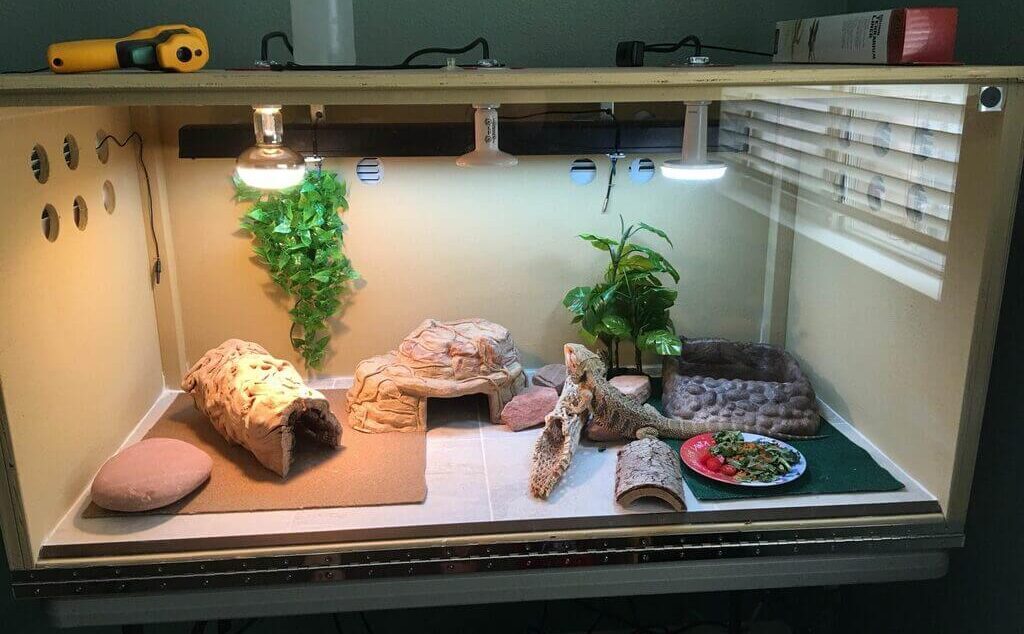
Adopting an exotic pet requires taking care to mimic that creature’s natural habitat as nearly as possible.
- A 120-gallon tank with the right amounts of light, heat, humidity, and substrate is required for bearded dragons. It will shorten their longevity if even one of these essential components is missing. This is not something to take lightly as some substrates can result in injury, harm, or even death.
- Your pet lizard may consume some substrates. Impaction can result from this, which is a major health problem. Use only non-particle substrates to reduce the possibility of impaction (e.g. reptile carpet).
- Give your dragon safe surfaces to dig behind or crawl on.
- A self-ballasted mercury vapor UVB lamp generates both the heat and UVB rays that your dragon needs to thrive. Every six months, replace the bulb for the highest quality.
- The lack of a darkened area is another error that many owners make. The heat lamp shouldn’t extend the full length of the tank. This might lead to overheating. A Bearded Dragon needs a thermal gradient as well as a cool side with cover. Death can occur from overheating.
- Check the temperature of the basking area frequently to make sure it’s not excessively hot or cold.
- Regularly check the tank’s temperature.
- To ensure that your dragon has a sound night’s sleep, keep the terrarium completely dark.
- Ensure that your tank is the appropriate size. A 40-gallon tank is typical, but you’ll need at least a 50-gallon tank if your dragon is 16 inches long. Keep their enclosure moist
- No residing together! Health problems, stress, malnutrition, death, and other problems may result from this.
Diet
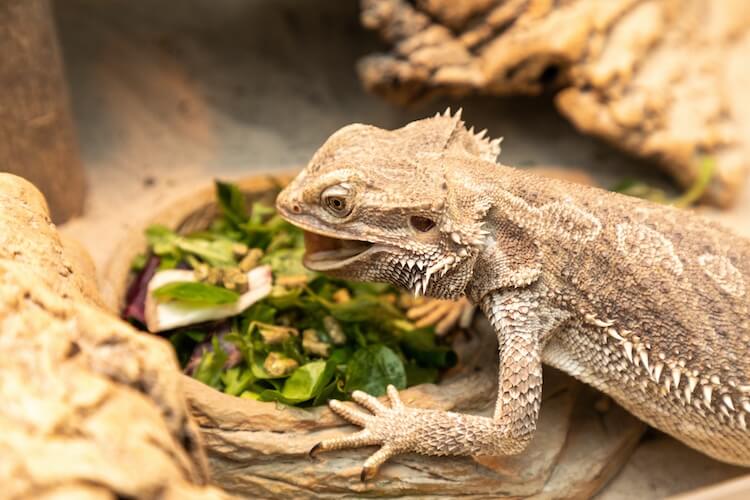
Similar to humans, a bearded dragon’s diet and nutrition have a significant impact on its general health. Life will be shorter and plagued with deficiencies and health problems for dragons whose diets are not well-balanced and contain all the key nutrients they require.
Dragons will live considerably longer and keep up good health if they are provided a varied food that satisfies all of their nutritional needs.
As your dragon ages, its nutrient needs will change. Dragons in their infancy initially consume roughly 75% insects and only 25% plant materials. While in the case of an adult bearded dragon, this is reversed, and its diet should be made up of 75% plant stuff and only 25% insects.
- Pick your insect feeder carefully. Dubia roaches are a fantastic choice to keep in mind because your dragon will benefit from them greatly.
- For best nutrition, use gut-load feeders.
- NEVER feed your dragon dangerous or deadly things, such as rhubarb, mushrooms, or avocados.
- Feed your dragon a lot of healthy greens! Some of the best everyday mainstays include turnip, mustard, collard, and prickly pear greens.
- Furthermore, don’t forget to sprinkle feeder insects with calcium powder, such as our 4-in-1 Reptile Greens and Calcium Powder! Calcium and vitamin D3 are essential for bearded dragon development and to fight off metabolic bone disease.
Disease prevention
Proper care for your bearded dragon and keeping an eye on its health are vital for illness prevention. Regular visits to the vet will also aid in the early detection of issues, improving the likelihood of a quick and painless recovery.
Disease symptoms in bearded dragons might vary according to the illness, but common red flags include fatigue or decreased appetite.
Stomatitis, metabolic bone disease, respiratory tract infections, gut impactions, and obesity are a few of the most prevalent ailments in bearded dragons.
Additionally, due to husbandry issues, female bearded dragons commonly fail to lay eggs, leaving retained follicles that may even burst inside.
Moreover, periodontal, or tooth and gum disease, affects a lot of bearded dragons. Regular veterinary appointments allow for the monitoring of dental health and the provision of medical assistance before it results in illness.
The improper quarantining of newborn reptiles leads to other frequent illnesses. Follow a strict quarantine protocol and get any new pets examined by a veterinarian before introducing them to other family members.
Unless they are housed with knowledgeable reptile breeders, bearded dragons are often lonely creatures. In a crowded environment, bears may hurt and traumatize one another, resulting in wounds and limb loss.
How to Extend the Lifespan of Your Bearded Dragon?
There are lots of ways to increase your beardie’s happiness and health, both of which will let them live a long full life! Always seek advice from your veterinarian, but here are some general suggestions:
- Routine veterinary examinations at least once each year
- Routine blood tests and annual fecal parasite screening
- Place all new reptiles into quarantine immediately upon arrival for a period of three to six months, and then conduct testing as directed by your veterinarian.
- Make sure the terrarium has adequate lighting, humidity, temperature gradients, and UVB lights that can be accessed.
- Never use heat or floor mats as they can result in thermal burns.
- Observe appropriate eating times according to life stages: Overeating can result in obesity and other medical problems.
- Feed only live, healthy insects and fresh veggies; desiccated insects have little nutritional value.
- Give your bearded dragon calcium and multivitamin supplements.
- Regularly check your bearded dragon for anomalies and keep an eye out for symptoms of the disease.
- Keep no more than one bearded dragon together unless you intend to breed them.
- Bearded dragons should live in terrariums that are at least 2-3 times the length of their nose to tail.
- Even if the UV bulbs are still producing visible light, they should be replaced every six months.
How Old Is My Bearded Dragon?
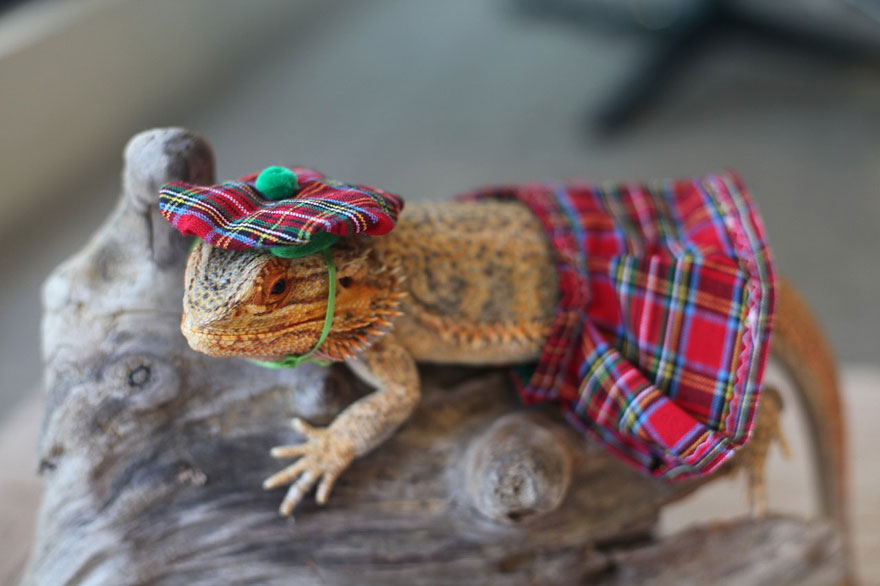
There are several ways to calculate your bearded dragon’s age if you don’t know exactly how old they are.
You can calculate the age of younger bearded dragons by measuring their length:
- A beardie that is 3–11 inches long is roughly 0–3 months old.
- A dragon d that is 9–22 inches long is roughly 4–12 months old.
- And a bearded dragon that is 12–24 inches long is over 12 months old.
It is important to keep in mind that a bearded dragon’s length depends on a variety of elements, including its species, genetics, and habitat.
By looking at your beardie’s sexual maturity, you can also determine their age. It takes a bearded dragon between 8 and 12 months of age to reach sexual maturity. You can estimate that your beardie is between the ages of 8 and 12 months after you know their gender.
Some Important Things To Keep In Mind If You Own A Bearded Dragon
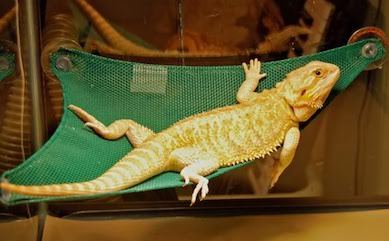
- Hydration is a crucial part of bearded dragon care that is usually overlooked by most pet owners. Your bearded dragon may be dehydrated if it is gaping when basking, and you may need to change the distance from the basking place.
- Long-term exposure to greater humidity raises your lizard’s risk of developing bacterial respiratory infections, which can have major long-term health consequences. Purchase a reliable hygrometer to keep track of your humidity levels. Instead of raising humidity levels, a good 20-minute soak is a good way to hydrate your bearded dragon.
- To ensure that the insects are clear of any parasites or infections that could harm your bearded dragon, only get them from reputed breeders.
- Some safe plants in your beardie’s tank and a hammock will keep them happy (which make bearded dragon live longer).
Hugues Beaufrere is the Exoticpetia’s senior writer and reptile expert. He has been fascinated by reptiles and monkeys since he was a kid and had years of experience in herpetology and primatology. He has cared for various kinds of Monkeys, Lizards and Reptiles and loves to share his knowledge and passion with others.


